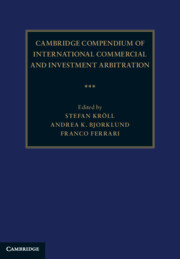Book contents
- Cambridge Compendium of International Commercial and Investment Arbitration
- Cambridge Compendium of International Commercial and Investment Arbitration
- Copyright page
- Contents
- Figures
- Tables
- Contributors
- Preface
- Part I Foundations
- Part II Public Law Questions Relating to Arbitration
- Part III Stakeholders in Arbitration
- Part IV Applicable Law
- Part V Jurisdiction of the Arbitrator
- Part VI The Arbitral Tribunal
- Part VII Procedural Questions in Arbitration
- 36 Implicit Consent and Unanticipated Risk in Class, Mass, and Collective Arbitration
- 37 The Principle of Equal Treatment in International Arbitration
- 38 Joinder of Third Parties
- 39 Evidentiary Issues in International Arbitration
- 40 Provisional Measures by Arbitrators and Emergency Arbitrators
- 41 Setting the Language (or Languages) of Arbitration – and the Impact of Language-Related Imperfections in Post-Award Proceedings
- Part VIII Role of State Courts in Arbitration
- Part IX Awards
- Part X Post-Award Issues
- Part XI Legal Concepts
- Part XII Areas of Concern
- Part XIII Arbitration and Related Fields
- Part XIV EU Law and Arbitration
37 - The Principle of Equal Treatment in International Arbitration
from Part VII - Procedural Questions in Arbitration
Published online by Cambridge University Press: 18 February 2023
- Cambridge Compendium of International Commercial and Investment Arbitration
- Cambridge Compendium of International Commercial and Investment Arbitration
- Copyright page
- Contents
- Figures
- Tables
- Contributors
- Preface
- Part I Foundations
- Part II Public Law Questions Relating to Arbitration
- Part III Stakeholders in Arbitration
- Part IV Applicable Law
- Part V Jurisdiction of the Arbitrator
- Part VI The Arbitral Tribunal
- Part VII Procedural Questions in Arbitration
- 36 Implicit Consent and Unanticipated Risk in Class, Mass, and Collective Arbitration
- 37 The Principle of Equal Treatment in International Arbitration
- 38 Joinder of Third Parties
- 39 Evidentiary Issues in International Arbitration
- 40 Provisional Measures by Arbitrators and Emergency Arbitrators
- 41 Setting the Language (or Languages) of Arbitration – and the Impact of Language-Related Imperfections in Post-Award Proceedings
- Part VIII Role of State Courts in Arbitration
- Part IX Awards
- Part X Post-Award Issues
- Part XI Legal Concepts
- Part XII Areas of Concern
- Part XIII Arbitration and Related Fields
- Part XIV EU Law and Arbitration
Summary
This chapter offers a contribution to the discourse on procedural equality in international arbitration by explaining its interaction with other basic norms that govern the arbitral process and proposing a framework to assess equality claims.The principle of equal treatment or procedural equality is a core adjudicative ideal that has a long history dating as far back as the Magna Carta Libertatum. Together with the right to an impartial and independent tribunal and the right to be heard, the principle of equal treatment provides a foundation for the arbitral process that is essential to ensure its legitimacy. The principle of equal treatment pervades every aspect of the arbitral process and must be given due regard at each stage of the proceedings: at the stage of tribunal constitution, when joining additional parties, allocating time, determining the scope of privilege or allowing non-disputing third parties to intervene, among others. While the importance of procedural equality in international arbitration is today well-established, less attention has been paid to how claims of equality ought to be assessed. Drawing on jurisprudence on equal treatment protections in international human rights law, this chapter proposes a two-step inquiry that first considers whether there is a rational basis for any differentiated treatment between the parties, before analysing whether the differentiated treatment creates an unfair disadvantage.
Keywords
- Type
- Chapter
- Information
- Publisher: Cambridge University PressPrint publication year: 2023

